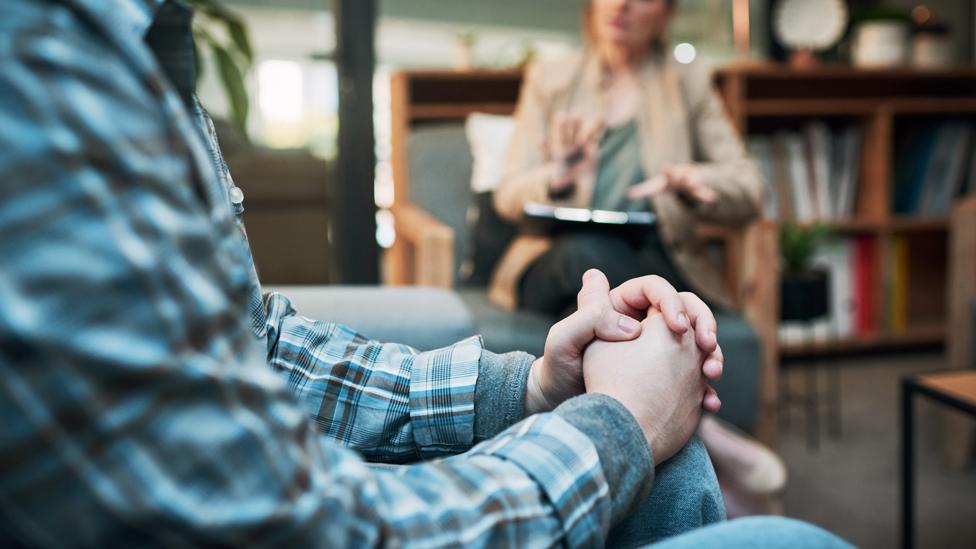Mental health: Unqualified therapists exploiting vulnerable patients
- Published

Jake looked for mental health support online
With a growing number of people struggling with mental health problems in the UK many are looking for counselling services to help them. But the largest membership body of therapists has raised concerns that unqualified practitioners offering treatments online are potentially exploiting vulnerable people.
Jake started to struggle with anxiety and panic attacks during his time at university. There was a six-week wait to see a therapist on campus so he began looking for help on Instagram.
He believed his symptoms could be obsessive-compulsive disorder (OCD) and he found a company that appeared to be offering the help he was looking for.
Jake says: "When a person has got quite a large following [on social media] and markets himself as a person with OCD and has got over it, you think that's a great sign because they know how to get you better, and because they've been through it they understand."
A 15-minute introductory session on the phone cost £200. Jake says he felt the practitioner was someone he could relate to and paid a further £1,200 for six 50-minute phone sessions.
He says: "The first couple of sessions were good. It seemed quite encouraging but then red flags started to show."
'In a vulnerable place'
Jake says the calls would be interrupted by background noise as the practitioner walked down the street, got taxi rides or even ate meals.
He says the sessions were cut short at 20 minutes and he would be told this was his fault because he was constantly looking for reassurance over his worries. He received no compensation despite paying for 50 minutes of treatment each time.
Jake says: "It got to the point where he sounded disinterested, and when I'd finished what I was saying, he wouldn't even respond."
Watch: Tips to find therapist
According to the mental health charity Mind, around 1.6 million people are currently on a waiting list for mental health support or treatment.
Currently anyone in the UK can call themselves a "therapist", "pyscho-therapist" or "counsellor" without standard qualifications or training.
Therapists operating outside of the NHS can choose whether to be a part of the accreditation system which is voluntary. If they choose to be part of one of the accredited bodies, these will have a code of ethics, complaints system and minimum qualifications which are all overseen by the Professional Standards Authority.
Jake mentioned the online treatment and the cost to his GP. She was concerned it was too expensive and questioned the qualifications of the practitioner.
But by this stage Jake says he wasn't sure who was right as the company claimed their treatment was better than what the GP could provide as they had been through the illness themselves.
"I was in a vulnerable place and I didn't know who to believe," he says.

Laura also found mental health treatment online and was asked by her therapist to film herself "doing exposures" - a type of treatment that requires the patient to face their fears in a controlled environment and in a measured way to gradually work on reducing anxiety.
"The video had to be of a certain length so they would fit on this person's Instagram feed," she says.
"We were asked to video ourselves in distress. We were told it would be helping people. If it wasn't quite right, we were told to do it again."
The videos were used as an advert to prospective clients on social media.
Laura says: "I can't believe people can give psychological treatment without being held accountable in any way.
"There would be consequences if somebody went to an unqualified doctor, and they've performed an operation on them or given them medication or treatment. Why is it not the same for mental health?"

Caroline Jesper from the British Association for Counselling and Pyschotherapy says a therapist should be "completely non-judgmental and respectful"
The British Association for Counselling and Psychotherapy (BACP) is calling for more awareness of the best way to seek help.
Caroline Jesper, its head of professional standards, says if someone is looking for therapy privately they should look for somebody who is registered with a professional body such as the BACP or UK Council for Psychotherapy.
These therapists have all been vetted to make sure they have the right qualifications and have a system where you can flag up any issues or complaints if you're not happy.
She also recommends asking questions about qualifications and experience of the therapist.
"In the ethical framework, it says we must be honest and transparent with our clients about our level of qualifications and training," she says. "So it's perfectly acceptable to ask those questions of a therapist.
"To create that safe, trusting, contained therapeutic relationship, a therapist needs to be authentic, genuine, grounded and be completely non-judgmental and respectful.
"You should be experiencing all of these things from your therapist, and if that doesn't feel right, if it doesn't feel like you're getting those kinds of common factors then it might be an indication that you're not working with the right person."
Related topics
- Published11 February 2021

- Published21 September 2021

- Published28 January 2020
